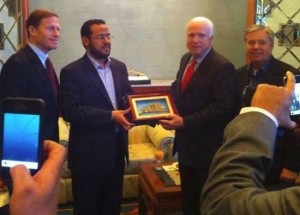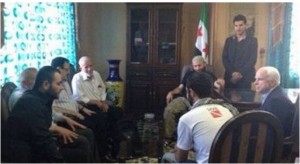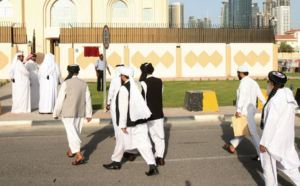nsnbc : European Union foreign policy chief Federica Mogherini and Turkey’s President R. Tayyip Erdogan have been travelling around the Gulf countries as part of the most recent efforts to heal the diplomatic rift between Qatar and the Saudi-led quartet.
During a meeting with Kuwaiti Foreign Minister Sabah Khaled Al Sabah on Sunday, Federica Mogherini pledged EU support and assistance for efforts to resolve the Gulf crisis that erupted last month. In a statement released by the European External Action Service, Mogherini stressed that the current situation should be resolved through dialogue and without delay. She was urging all parties to enter into negotiations to hammer out clear principles and a roadmap for a swift resolution.
The Saudi-led quartet, which also includes the United Arab Emirates (UAE), Bahrain and Egypt, cut diplomatic ties with Qatar on June 5 and imposed a blockade on the Gulf nation. Accusing Doha of supporting terrorism and interfering in their internal affairs, the countries initially put forward a list of 13 demands to Qatar, demanding it close the Al-Jazeera channels, downgrading diplomatic ties with Iran and stopping financing extremist groups. Qatar has strongly denied the charges.
Also on Sunday, Turkish President Recep Tayyip Erdogan, as part of his country’s renewed mediation efforts, met with Saudi Arabian King Salman bin Abdulaziz. Erdogan’s Gulf tour will also take him to Qatar and Kuwait. Turkey has publicly sided with Qatar, with which it has expansive economic and security ties, while criticizing the Saudi-led blockade as inhumane.
Earlier Sunday, Erdogan told reporters in Istanbul that Turkey is seeking an immediate resolution to the ongoing diplomatic row in the Gulf. “Nobody has any interest in prolonging this crisis anymore,” he said.

US Senator John McCain hobnobbing with Abdelhakim Belhadj, leader of the Libyan Islamic Fighting Group.
Among the 13 demands put forward by the Saudi-led bloc is the closure of a Turkish military base in Qatar. Turkey has deployed a number of troops in the base recently in a move aimed at bolstering Qatar’s defiance in the face of sanctions and threats from its neighbors. Ankara has refused to withdraw troops from Qatar, a move that has frustrated the four Arab countries.
Highlighting the fallouts of the dispute in and beyond the region, Erdogan and Mogherini were among a string of high-level visitors form outside the Gulf, including top diplomats from Britain, France, Germany and the United States.
Signs of easing of the crisis have emerged recently after the Gulf visit by U.S. Secretary of State Rex Tillerson, during which the United States and Qatar signed a deal on combating terrorism funding. This addressed one of the core demands by the Saudi-led bloc, which has slammed Doha for financing and supporting a number of extremist groups including the Muslim Brotherhood in Egypt, the Hamas movement in Gaza Strip and Hezbollah in Lebanon.
Qatar has revised its law on fighting terrorism over the week, a move that was welcomed by the UAE as a “positive step.” Qatari Emir Sheikh Tamim bin Hamad Al Thani said Friday that Qatar is prepared to engage in dialogue, provided that any resolution to the crisis must respect its sovereignty and any terms cannot be dictated from the outside.

Photo of U.S. Senator John McCain meeting illegally in a rebel safe house with the heads of the “Free Syrian Army” in Idlib, Syria in April, 2013. In the left foreground, top al Qaeda terrorist leader Ibrahim al-Badri (aka Al-Baghdadi of ISIS, a.k.a. Caliph Ibrahim of the recently founded Islamic State with whom the Senator is talking. Behind Badri is visible Brigadier General Salim Idris (with glasses), the former military chief of the FSA, who has since fled to the Gulf states after the collapse of any semblance of the FSA.
Ironically, the “issue” pertaining Qatar’s “support of terrorism” highlights the use of social constructionism, utilitarianism and a great deal of hypocrisy with regard to determining who and what terrorists and terrorist State sponsors are, and what ought to be done about them.
Qatar and Turkey have for years overtly supported Muslim Brotherhood affiliated organizations including terrorist organizations operating in Syria. Saudi Arabia (plus Turkey and at one time networks within the USA) cooperated with the Islamic State, which in turn is designated as a terrorist organization by Hezbollah, one of the “terrorist” organizations Iran and Qatar support and which is operating in Syria with permission of the Syrian government to fight ISIS and al-Qada / al-Nusra. If that seems to be confusing, you may want to read nsnbc international more often.
CH/L – nsnbc 24.07.2018
nsnbc international is primarily funded by donations from readers like you. If you appreciate our work, please use the PayPal button in the right column to chip in.
Source Article from https://nsnbc.me/2017/07/24/eu-foreign-affairs-chief-mogherini-and-turkeys-erdogan-on-a-mission-to-defuse-qatar-crisis/
Related posts:
Views: 0
 RSS Feed
RSS Feed

















 July 24th, 2017
July 24th, 2017  Awake Goy
Awake Goy 











 Posted in
Posted in  Tags:
Tags: 
















